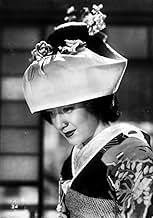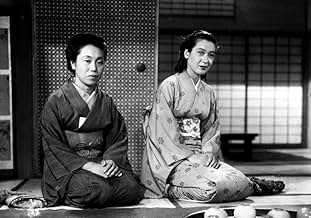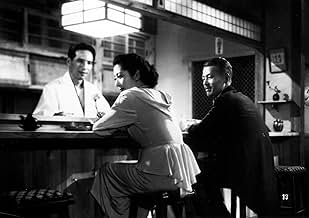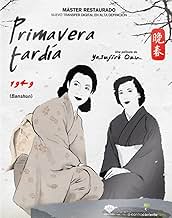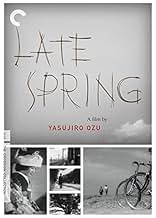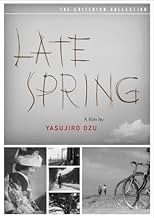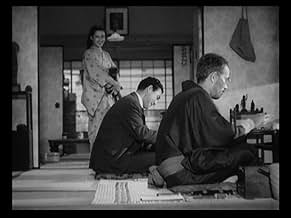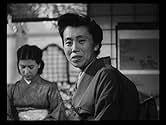Noriko a 27 ans et vit encore avec son père veuf. Tout le monde tente de la convaincre de se marier, mais elle veut rester à la maison pour s'occuper de celui-ci.Noriko a 27 ans et vit encore avec son père veuf. Tout le monde tente de la convaincre de se marier, mais elle veut rester à la maison pour s'occuper de celui-ci.Noriko a 27 ans et vit encore avec son père veuf. Tout le monde tente de la convaincre de se marier, mais elle veut rester à la maison pour s'occuper de celui-ci.
- Réalisation
- Scénario
- Casting principal
- Récompenses
- 5 victoires au total
- Shige
- (as Toyoko Takahashi)
Avis à la une
Well, I would like to say that Hara did a very realistic portrayal of her character. The women of 1949 Japan had her mannerisms that we will probably find "annoying".
This is a difficult film for those who are not used to "Eastern" style of films. Especially ones from the 1940s. As long as we watch with an open mind, the theme of the film is as universal as it can get. Who knows? In 50 years, someone will make fun of Naomi Watts' acting in "21 Grams" deeming it unrealistic.
The film is made in 1949, four years after the defeat of Japan, but there are no ruins in sight, on the contrary, landscapes are proper and well maintained, homes are clean and nothing seems to be missing, people live their lives in a way that seems to go on for centuries. The American presence is just hinted by a Coca-Cola sign, or English inscriptions at train stations. Maybe a political statement by Ozu about the perennial continuity of the Japanese civilization despite the destruction Japan had just gone through.
The war is also hardly remembered and hidden back in the past. We learn that the principal hero Noriko (wonderfully acted by Ozu's preferred actress of the period Setsuko Hara) was interned in a labor camp during the war, but nothing in her demeanor and certainly not her radiant smile lets anybody feel about her suffering. She loves being at home and taking care of her father (Chishu Ryu, another favorite actor of Ozu) with a devotion that is troubled only by the insistence of the family to get her married, as social customs demand for a young woman of her age. Eventually she will be curved into accepting a marriage arrangement under pressure by her caring aunt and by her father, who would make anything to have her happy, but only according to the customs and their own conceptions.
It's wonderful to watch how this delicate family drama is being filmed, with a taste and aesthetic balance that makes of each scene a masterpiece worth being seen for its own. Ozu is also a master of using soundtrack, and his matching of visuals and sound sometimes equally effective in creating emotion reminds the use that Hitchcock makes of music in his films.
There is a lot of symbolism in this movie, and I certainly have lost some of the more subtle messages because of my lack of familiarity with Japanese customs and culture. And yet this film is at the same time simple, as well as modern and universal in look, we can resonate with the characters and I had less difficulty in understanding their emotions than in many other Japanese or Far East movies seen through the perspective of my 'western' eyes. At the same time the film has a wonderful human dimension, we can see on screen a story of love and affection between two people who need and are willing to make a huge sacrifice in order for the other one to be happy. This combination of emotions, simplicity and art cinema makes of this movie a real treat.
In Late Spring, a widowed Professor, Somiya (Chishu Ryu), must face the inevitability of giving up his daughter, Noriko (Setsuko Hara) to marriage. Noriko, however, wants only to continue to live at home and care for her father and insists that marriage is not for her. Yet the social pressure to marry continues to build, coming not only from her father but also from Somiya's sister Masa (Haruko Sugimura) whom she calls "Auntie", and from a friend, the widower Onodera (Masao Mishima) who has recently remarried. Masa, unrelenting, presents Noriko with a prospect named Satake who reminds her of actor Gary Cooper, but she is still reluctant. To make it easier for Noriko to decide, Somiya tells her that he is planning to remarry and she will no longer need to take care of him. Noriko's agonizes over her decision and her once beaming face increasingly carries hints of resignation. At the end, the old man sits alone peeling a piece of fruit as the ocean waves signal the inexorable flow of timeless things.
Le saviez-vous
- AnecdotesMost of the movie takes place in Kita-Kamakura, about 30 miles from downtown Tokyo. Several years after the release of the film, the director, Yasujirô Ozu, moved with his mother to the area and spent the rest of his life there. (His tomb is also located there.) Furthermore, the film's star, Setsuko Hara, also eventually moved to the area and, as of May 2013, reportedly still lived there under her birth name, Masae Aida.
- GaffesA camera/dolly shadow is visible on the sidewalk as it follows Noriko walking.
- Citations
Shukichi Somiya: Marriage may not mean happiness from the start. To expect such immediate happiness is a mistake. Happiness isn't something you wait around for. It's something you create yourself. Getting married isn't happiness. Happiness lies in the forging of a new life shared together. It may take a year or two, maybe even five or ten. Happiness comes only through effort. Only then can you claim to be man and wife.
- ConnexionsFeatured in Shôchiku eiga sanjû-nen: Omoide no album (1950)
Meilleurs choix
- How long is Late Spring?Alimenté par Alexa
Détails
- Date de sortie
- Pays d’origine
- Site officiel
- Langue
- Aussi connu sous le nom de
- La fin du printemps
- Lieux de tournage
- Société de production
- Voir plus de crédits d'entreprise sur IMDbPro
Box-office
- Montant brut aux États-Unis et au Canada
- 13 254 $US
- Week-end de sortie aux États-Unis et au Canada
- 6 456 $US
- 6 mars 2016
- Montant brut mondial
- 19 681 $US
- Durée1 heure 50 minutes
- Couleur
- Mixage
- Rapport de forme
- 1.37 : 1
Contribuer à cette page



